
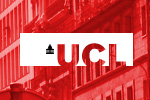
 |
 |
Language and politicsIn Brussels, language and politics are intextricably linked, because all political parties are either French speaking or Dutch spreaking. So in order to make a political choice, people always have to make a language choice first. This situation is a political compromise, but it is a far cry from reality in Brussels today. After all, for nearly half of all Brussels inhabitants, this division on the basis of language is irrelevant. The ‘other’ population of Brussels has been busy catching up during the last few years, and they have now become more visible in the political landscape. They have joined the ranks of French or Dutch speaking political parties and are also part of bilingual municipal parties. So even though they have no stake in the language battle, they do know how to play the system. Dutch or French?Whenever the Belgian people of Brussels have to vote for the federal. the >communal or the regional elections, they have to make a language choice before they can make a political one. The reason for this is that ministerial postions and seats should be distributed ‘equally’ among both language communities. This explains why all political parties are either French or Dutch speaking and as a consequence, the programmes of ideological sister parties are not necessarily the same. For example, it is possible that a French speaker in Brussels votes for the Flemish socialist party. Or a Dutch speaker may vote for the French green party Ecolo, because it has a stronger voice in the Brussels parliament than Flemish >Groen! As there is no such thing as subnationality in Brussels, everybody simply chooses the language and party they fancy, irrespective of the language group they consider themselves part of. Brussels RegionIn 2004, it was established that the Brussels Capital Council would consist of 89 members, 17 of which had to be Dutch-speaking and 72 French-speaking, regardless of the election results. The Brussels Regional government is composed of four ministers, with a guaranteed two of each language community. Therefore, the Dutch speakers have a fixed political representation, no matter how many votes or number of citizens they represent. If you consider that about 10% of the Brussels population describes themselves as Dutch-speaking, this representation seems disproportionate. However, it is the result of many years of discussions, and –as far as the Flemish are concerned- concessions to the French speakers in other areas. Moreover, the Flemish regard Brussels as a very symbolic part of their ‘territory’, while French speakers are generally less attached to the idea of ‘annexing’ Brussels to their Community. They are mainly keen on the economical independence of their Region, Wallonia. municipalLocally, the situation is different for two reasons. First of all, since 2000, all EU citizens who are resident in the Brussels Capital Region, are allowed to vote and from 2006 onwards, also non-EU residents who have lived in the country for more than five years. Secondly, bilingual lists of candidates are allowed here. There are no rules for the distribution of seats between French and Dutch-speaking members so there is no need for voters to make a language choice this time. The reason is of course that the local governments should mirror the composition of the local population. (From 2006, local administrations should also include at least 50% women.) political participation of allochtonous Belgians For a long time, Brussels residents of foreign origin did not have a political voice, simply because they did not have Belgian nationality. Particularly for non-EU immigrants, it was also quite hard to acquire this. This has changed since 1991, when the >naturalisation law was adjusted. As a consequence, we can observe a massive naturalisation of Turkish and Moroccan inhabitants in the nineties. Gradually, these ‘other’ inhabitants of Brussels have become visible in the political field. After the 2000 local elections, on average 13.8% of all municipal councillors in the Brussels Capital Region were of non-EU origin. Naturally, there are big differences between the municipalities; in a place such as Sint Joost, the ‘foreign’ representation is nearly 50%, whereas Watermaal-Bosvoorde has none. Other municipalities with large scores are Brussel-city and Molenbeek. The majority of these elected council members is of Moroccan descent. ‘Other’ faces can now also be spotted in national politics. Well-known examples are Elio Di Rupo, leader of the Parti Socialiste [French socialist party], Emir Kir (also PS), minister in the Brussels Regional government and Gisèle Mandaila (MR-FDF) [liberal – Brussels democratic forum], federal state secretary for family matters. They are respectively of Italian, Turkish and Congolese descent and all of them French speaking. 
An example of a Flemish allochtonous politician is Fouad Ahidar. migrantsí suffrageMeanwhile, after a lot of polical palaver, a law was passed in 2004 that grants immigrants of non-EU nationality the right to vote in the local elections, without being eligible themselves. It was mainly the Flemish political parties (and not only the far right >Vlaams Belang) who tried to stop this evolution. The French speaking parties on the other hand, were unanimously in favour, with the single exception of the far right Front National. On the Flemish side, it was feared that granting the right to vote locally to –mostly French speaking- immigrants, would accelerate the Frenchification process in the administration. political participation of EU citizensDuring the local elections of 2000, it was the first time that citizens of other EU countries, resident in Brussels, were allowed to vote as well as be eligible. They make up nearly 20% of the total Brussels electorate, so their contribution could have significant consequences. However, their turnout was very small. Only 10% of all non-Belgian EU voters cast their vote. Nevertheless, their share in some Brussels municipalities is very large. In Sint Gillis for example, 35 % of all voters are EU citizens (non-Belgian) and only 14% of them voted. Ganshoren was the most succesful municipality in terms of EU voters; nearly 20% of their EU electorate voted, even though their share in the entire electorate is only 1.6%. So the expected commotion did not occur and hardly any non-Belgian EU citizens were elected. This could possibly change in the future if candidates mobilise this potentially large group more consciously. Belgian compromiseAs the language choices made by Brussels residents already indicate (see >language use) most of them are not terribly bothered by the whole French/Dutch political divide. Even those who consider themselves part of the French or Dutch speaking language group, do not necessarily vote for someone with the same language background. Some might vote for an >allochtonous person out of sympathy. The same thing may happen the other way around, a person of foreign descent will not necessarily vote for someone with the same ethnic background, even though so-called ‘ethnic’ votes are not unlikely. When asked about language preference in their voting behaviour, about a third of the population says they would vote for monolingual French parties. The majority however, is in favour of representative lists, inclusive of all sections of the community in Brussels. Dutch speakers and bilingual (Dutch/French) speakers view things slightly more narrowly and prefer bilingual lists. When asked about the language conflict, a large majority answers that they don’t see this as a big problem. Unemployment and safety are regarded as the major issues and according to most, priority should be given to urgent measures for relieving tensions in the relations between Belgians and immigrants as well as education. Living in Brussels: SaÔd Al-Haddad (26), voice of FM WorldLast year, Al-Haddad took his seat behind FM World’s microphone, the international weekend programme of FM Brussel. “Dealing with the multilingualism of Brussels and constantly meeting new people, I think is fascinating. Furthermore, within the rigid structure of the programme, I have received a lot of freedom to choose topics. That is great, not many people are granted that luxury. I look at it very broadly, from a biography about Led Zeppelin to dealing with religious issues or the tensions between communities. It is madly interesting, I have learned a great deal about Brussels already, for example that the lack of communication is probably the biggest issue of this city. Each time a Eurocrat sits in my studio, he says: “We have no contact with Belgians.” They don’t know what we are doing, nor do we know anything about them and so there is an irreconcilable gap. With FM World, we try to create some exchange. Also between French and the Dutch speakers.” from: Brussel deze week, 17/09/2005 political view on integration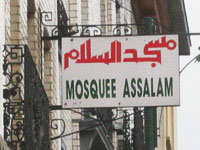 During the nineties, the ‘immigrant problem’ became a controversial political topic. Integration and participation were the magic words in order to relieve social tensions. As a consequence, most political parties wanted to be seen as progressive and put a few >allochtonous people on their lists. It didn’t take long for immigrant organisations to react to this strategy because some of the candidates were literally ‘picked off the street’, regardless of their knowledge or qualities. Du côté francophone, […] c’est vraiment le système « á la française », c’est la liberté individuelle, vous êtes libre, vous devez vous débrouiller seul dans ce que vous faites. Du côté néerlandophone, c’est un peu le système hollandais ou anglosaxon peut-être, les minorites éxistent en tant que groupe. Des deux cotés, on peut dire qu’il y a du pour et du contre, je pense que lorsqu’on est à Bruxelles, je dis toujours que c’est une expérience unique […]. (source: Jacobs & Swyngedouw, 2002) 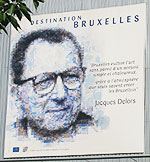 As a consequence of this situation, many self organisations, most of which use French as a lingua franca, ironically enough choose for more loyalty and collaboration with the Flemish, rather than the French speaking Community. This illustrates that their use of French does not automatically mean that these groups feel politically or culturally affiliated with the the French Community. Minorities in Brussels that speak languages other than the official two will describe themselves in the first place as Belgian or Brussels citizens. They often express annoyance at the constant choice between French and Flemish, more so because Brussels consists of so many more communities and language groups. the federal immigrants policySimilarly to the Netherlands, Belgium for a long time did not have a specific immigrants policy. Initially it was assumed that so-called ‘>guest workers’ would only stay temporarily. It is only in the eighties that things begin to change. After the state reforms of 1980, for the first time, the authority for reception and integration of immigrants is officially transferred to the Flemish and French speaking communities. The actual policy remains in the hands of the federal government. There is no mention of an integrated approach, it is only a social ‘problem’. This changes in 1988 after the large electoral gain for the far right, who put the ‘migrants problem’ at the top of their agenda. A commission is called into being that has to work out a policy. The policy guidelines that follow focus on an integration model which falls between assimilation and segregation. It is called ‘fitting in’. Migrants should overcome their socio-economic disadvantage, with a preservation of their cultural identity, so participation of allochtonous groups is key to success. the integration policy of the >regional governmentsThe Flemish Community refines its integration policy in 1998. Apart from old and new immigrants, it also includes refugees, travellers and illegal immigrants. The ‘immigrants policy’ is now called ‘ethnocultural minorities policy’, which has defined three lines of policy:
Citizenship is a central concept in the current reception policy for newcomers. Some newcomers take compulsory language courses, have to acquire knowledge about the ins and outs of the Belgian state and receive career guidance. A number of national immigrant movements receive official recognition and target groups can voice their opinions via the minorities forum (@www.minderhedenforum.be) [Dutch-language website of the Minorities Forum (Minderhedenforum)], which offers policy advise. This forum has set up a Brussels platform, in which 36 organisations are represented. Their priorities are education and employment. question 10Why do you think that the Flemish Government has changed the name of its policy? >AnswerThe French Community Commission in Brussels mainly deals with social groups and dynamics rather than ethnocultural groups [see also >concept of integration]. They will support projects for young people in deprived areas for example, or campaigns against racism. Their focus is on the societal integration of people via education, training, employment and culture. They do also subsidise the Centre Bruxellois d’Action Interculturelle (@www.cbai.be) [Website (in French) of the Brussels Action Centre for the promotion of multiculturality in the capital] which organises all sorts of intercultural activities and supports self organisations. The Brussels Capital Region mainly aims at regenerating areas; not just by improving the infrastructure and refurbishing buildings, but also by working on safety, neighbourhood initiatives and employment. For example, they develop intiatives to counteract discrimination in the recruitment process of local government officials. Flemish fire died down?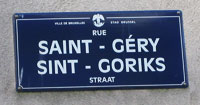 As far as the Frenchification of Brussels is concerned, the situation has more or less stagnated and the situation for most Dutch speakers, particularly for recent immigrants from Flanders, is advantageous. They are mostly young, wealthy and well educated. Many of them settle in the old city centre, which has seen a revaluation because of it. This elicited the remark by Brussels’ city mayor Thielemans in the popular weekly Humo that he was worried about the ‘Flemish ghettoisation of the Dansaert area’. question 11Why is this remark ironic, if you take into account the history of the Flemish in Brussels? >Answer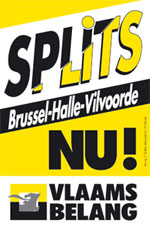 The >communal disputes are far from resolved. Even though the Flemish or rather the Dutch speakers in Brussels, have safeguarded their position, the >Frenchification remains a burning issue for Flemish-minded politicians. They are mainly concerned about the Frenchification of the Flemish >periphery particularly in the >facility municipalities. There is also talk among Flemish politicians now to freeze these facilities. Another example is the ongoing conflict about the electoral district Brussel-Halle-Vilvoorde. The bilingual Brussels Capital Region constitues an electoral and judicial district together with the monolingual Flemish municipalities Halle and Vilvoorde. This has been decided in the past in order to give the Dutch speakers a bit more say. But meanwhile, more and more French speakers have moved into the Flemish region and, because of this electoral situation, they can also vote for French speaking parties. Flemish parties lose votes because of this and are now asking for a split of the electoral district. However, as a consequence of this, the Flemish parties would become weaker in the Brussels Capital Region. The French speakers on the other hand are threatening, should the separation occur, to incorporate Brussels with Wallonia. Naturally, none of these threats can be legally carried out at the moment as they would require another round of state reforms. Living in Brussels: Kris Verdonck, artist “I don’t really care about the conflict between Dutch and French speakers. Voeren, Brussel-Halle-Vilvoorde, no, the petty affair of those principle issues; I simply couldn’t be bothered. There are so many more important problems that need solutions than rear gard actions within the language struggle. If so many people all of a sudden seem to be involved with it, it is only because polticians and the media make such a fuss about it, that’s what I think. It is psychological. Ask any Fleming or Walloon what Brussel-Halle-Vilvoorde is about and the large majority will not be able to give you a satisfying answer. It is just like the villager who votes >Vlaams Belang but who has never seen a foreigner close-up. Or the car driver who listens to messages about traffic jams all day and feels as if it has bothered him, even though he wasn’t in any of them.” from: Brussel deze week, 07/05/2005 These conflicts go way over the head of the average Brussels citizen and are generally played out in strict political quarters. This does not alter the fact that they have the potential to completely paralyse the Belgian political scene. |